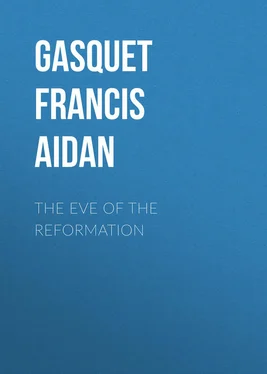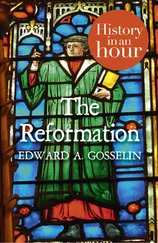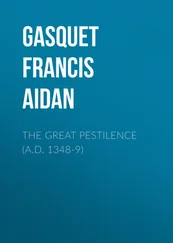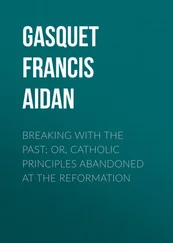Francis Gasquet - The Eve of the Reformation
Здесь есть возможность читать онлайн «Francis Gasquet - The Eve of the Reformation» — ознакомительный отрывок электронной книги совершенно бесплатно, а после прочтения отрывка купить полную версию. В некоторых случаях можно слушать аудио, скачать через торрент в формате fb2 и присутствует краткое содержание. Жанр: foreign_antique, foreign_prose, на английском языке. Описание произведения, (предисловие) а так же отзывы посетителей доступны на портале библиотеки ЛибКат.
- Название:The Eve of the Reformation
- Автор:
- Жанр:
- Год:неизвестен
- ISBN:нет данных
- Рейтинг книги:3 / 5. Голосов: 1
-
Избранное:Добавить в избранное
- Отзывы:
-
Ваша оценка:
- 60
- 1
- 2
- 3
- 4
- 5
The Eve of the Reformation: краткое содержание, описание и аннотация
Предлагаем к чтению аннотацию, описание, краткое содержание или предисловие (зависит от того, что написал сам автор книги «The Eve of the Reformation»). Если вы не нашли необходимую информацию о книге — напишите в комментариях, мы постараемся отыскать её.
The Eve of the Reformation — читать онлайн ознакомительный отрывок
Ниже представлен текст книги, разбитый по страницам. Система сохранения места последней прочитанной страницы, позволяет с удобством читать онлайн бесплатно книгу «The Eve of the Reformation», без необходимости каждый раз заново искать на чём Вы остановились. Поставьте закладку, и сможете в любой момент перейти на страницу, на которой закончили чтение.
Интервал:
Закладка:
The same temper of mind appears in the preface of a book called The Defence of Peace , translated into English by William Marshall and printed in 1535. The work itself was written by Marsilius of Padua about 1323, but the preface is dated 1522. The whole tone is distinctly anti-clerical, but the main line of attack is developed from the side of the temporalities possessed by churchmen. Even churchmen, he says, look mainly to the increase of their worldly goods. “Riches give honour, riches give benefices, riches give power and authority, riches cause men to be regarded and greatly esteemed.” Especially is the author of the preface severe upon the temporal position which the Pope claims as inalienably united with his office as head of the Church. Benedict XII., he says, acted in many places as if he were all powerful, appointing rulers and officers in cities within the emperor’s dominions, saying, “that all power and rule and empire was his own, for as much as whosoever is the successor of Peter on earth is the only Vicar or deputy of Jesus Christ the King of Heaven.” 114 114 The Defence of Peace, written in Latin more than 200 years ago, and set forth in the English tongue by Wyllyam Marshall. R. Wyer, 1535, folio.
In the body of the book itself the same views are expressed. The authority of the primacy is said to be “not immediately from God, but by the will and mind of man, just as other offices of a commonwealth are,” and that the real meaning and extent of the claims put forward by the Pope can be seen easily. They are temporal, not spiritual. “This is the meaning of this title among the Bishops of Rome, that as Christ had the fulness of power and jurisdiction over all kings, princes, commonwealth, companies, or fellowships, and all singular persons, so in like manner they who call themselves the Vicars of Christ and Peter, have also the same fulness of enactive jurisdiction, determined by no law of man,” and thus it is that “the Bishops of Rome, with their desire for dominion, have been the cause of discords and wars.” 115 115 The Defence of Peace , f. 42. The well-known anti-papal opinions of Marsilius of Padua are, of course, of no interest in themselves, but their publication at this time in English shows the methods by which it was hoped to undermine the Papal authority in the country.
Lancelot Ridley, in his Exposition of the Epistle of Jude , published in 1538 after the breach with Rome, takes the same line. The Pope has no right to have “exempted himself” and “other spiritual men from the obedience to the civil rulers and powers.” Some, indeed, he says, “set up the usurped power of the Bishop of Rome above kings, princes, and emperors, and that by the ordinance of God, as if God and His Holy Scripture did give to the Bishop of Rome a secular power above kings, princes, and emperors here in this world. It is evident by Scripture that the Bishop of Rome has no other power but at the pleasure of princes, than in the ministration of the Word of God in preaching God’s Word purely and sincerely, to reprove by it evil men, and to do such things as become a preacher, a bishop, a minister of God’s Word to do. Other power Scripture does not attribute to the Bishop of Rome, nor suffer him to use. Scripture wills him to be a bishop, and to do the office of a bishop, and not to play the prince, the king, the emperor, the lord, and so forth.” 116 116 Exposition , &c., ut supra , f. i.
It is important to note in this passage that the writer was a reformer, and that he was expressing his views after the jurisdiction of the Holy See had been rejected by the king and his advisers. The ground of the rejection, according to him – or at any rate the reason which it was desired to emphasise before the public – would appear to be the temporal authority which the Popes had been exercising.
In the same year, 1538, Richard Morysine published a translation of a letter addressed by John Sturmius, the Lutheran, to the cardinals appointed by Pope Paul III. to consider what could be done to stem the evils which threatened the Church. As the work of this Papal commission was then directly put before the English people, some account of it is almost necessary. The commission consisted of four cardinals, two archbishops, one bishop, the abbot of San Giorgio, Venice, and the master of the Sacred Palace, and its report was supposed to have been drafted by Cardinal Caraffa, afterwards Pope Paul IV. The document thanks God who has inspired the Pope “to put forth his hand to support the ruins of the tottering and almost fallen Church of Christ, and to raise it again to its pristine height.” As a beginning, the Holy Father has commanded them to lay bare to him “those most grave abuses, that is diseases, by which the Church of God, and this Roman curia especially, is afflicted,” and which has brought about the state of ruin now so evident. The initial cause of all has been, they declare, that the Popes have surrounded themselves with people who only told them what they thought would be pleasant to them, and who had not the honesty and loyalty to speak the truth. This adulation had deceived the Roman Pontiffs about many things. “To get the truth to their ears was always most difficult. Teachers sprung up who were ready to declare that the Pope was the master of all benefices, and as master might by right sell them as his own.” As a consequence, it was taught that the Pope could not be guilty of simony, and that the will of the Pope was the highest law, and could override all law. “From this source, Holy Father,” they continue, “as from the Trojan horse, so many abuses and most grievous diseases have grown up in the Church of God.” Even pagans, they say, scoff at the state of the Christian Church as it is at present, and they, the commissioners, beg the Pope not to delay in immediately taking in hand the correction of the manifest abuses which afflict and disgrace the Church of Christ. “Begin the cure,” they say, “whence sprung the disease. Follow the teaching of the Apostle St. Paul: ‘be a dispenser, not a lord.’”
They then proceed to note the abuses which to them are most apparent, and to suggest remedies. We are not concerned with these further than to point out that, as a preliminary, they state that the true principle of government is, that what is the law must be kept, and that dispensations should be granted only on the most urgent causes, since nothing brings government to such bad repute as the continual exercise of the power of dispensation. Further, they note that it is certainly not lawful for the Vicar of Christ to make any profit ( lucrum ) by the dispensations he is obliged to give.
Sturmius, in his preface, says he had hopes of better things, now that there was a Pope ready to listen. “It is a rare thing, and much more than man could hope for, that there should come a Bishop of Rome who would require his prelates upon their oath to open the truth, to show abuses, and to seek remedies for them.” He is pleased to think that these four cardinals, Sadolet, Paul Caraffa, Contarini, and Reginald Pole had allowed fully and frankly that a great portion of the difficulty had come from the unfortunate attitude of the Popes in regard to worldly affairs. “You acknowledge,” he says, “that no lordship is committed to the Bishop of Rome, but rather a certain cure by which he may rule things in the church according to good order. If you admit this to be true and will entirely grant us this, a great part of our ( i. e. Lutheran) controversy is taken away; granting this also, that we did not dissent from you without great and just causes.” The three points the cardinals claimed for the Pope, it may be noted, were: (1) that he was to be Bishop of Rome; (2) that he was to be universal Bishop; and (3) that he should be allowed temporal sovereignty over certain cities in Italy. 117Again we find the same view put before the English people in this translation: the chief objection to the admission of Papal prerogatives was the “lordship” which he claimed over and above the spiritual powers he exercised as successor of St. Peter. On this point we find preachers and writers of the period insisting most clearly and definitely. Some, of course, attack the spiritual jurisdiction directly, but most commonly such attacks are flavoured and served up for general consumption by a supply of abuse of the temporal assumptions and the worldly show of the Popes. This appealed to the popular mind, and to the growing sense of national aims and objects, and the real issue of the spiritual headship was obscured by the plea of national sentiment and safeguards.
Читать дальшеИнтервал:
Закладка:
Похожие книги на «The Eve of the Reformation»
Представляем Вашему вниманию похожие книги на «The Eve of the Reformation» списком для выбора. Мы отобрали схожую по названию и смыслу литературу в надежде предоставить читателям больше вариантов отыскать новые, интересные, ещё непрочитанные произведения.
Обсуждение, отзывы о книге «The Eve of the Reformation» и просто собственные мнения читателей. Оставьте ваши комментарии, напишите, что Вы думаете о произведении, его смысле или главных героях. Укажите что конкретно понравилось, а что нет, и почему Вы так считаете.












